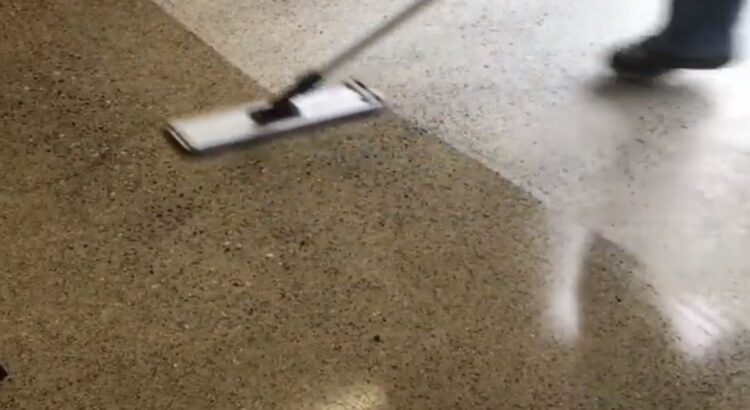Grind and Seal vs Fully Polished Concrete: The Distinctions
Choosing the ideal finish for your concrete floor is crucial in enhancing the aesthetics and durability of the space. In Auckland’s residential and commercial sectors, ‘Grind and Seal‘ and ‘Fully Polished Concrete‘ are two prominent choices. But what sets these two apart?
Grind and Seal Explained
Grind and seal is a method where the concrete is ground to the desired exposure level. A clear topical sealer is then applied to guard the concrete. Sealers can vary from matte to high gloss, depending on individual tastes.
Environmental Benefit: Grind and seal often employ water-based sealers, which are environmentally friendly, hence lowering the environmental impact of your construction project.
Delving into Fully Polished Concrete
Fully polished concrete floor undergoes multiple grinding phases with diamond tooling. After grinding, a densifier is applied to solidify the concrete. It’s then further honed and polished to the desired sheen and smoothness.
Environmental Advantage: Densifiers often contain natural compounds and do not emit VOCs (Volatile Organic Compounds), ensuring the process is environmentally responsible.
Cost and Suburb Differences
The choice of floor finish can be influenced by style preferences and housing types, which can vary across suburbs like Ponsonby to Manukau.
- Ponsonby: The suburb, dominated by classic villas, sees a preference for fully polished concrete for its ageless and seamless look. Costs here can range from $98 to $168 per square metre.
- Manukau: A blend of contemporary homes and commercial spaces, grind and seal is a popular choice due to its glossy finish and budget-friendliness, costing between $70 to $126 per square metre.
Auckland Bylaws and Consents
The Auckland council maintains specific bylaws around construction and remodelling. While standard floor grinding may not demand council consent, larger endeavours, especially those impacting structural integrity or exterior aesthetics, might. In places like the Waitakere ranges, building codes may limit finish types due to environmental and heritage considerations. It’s always prudent to check with the local regional council and be aware of pertinent codes.
Summary Table: Grind and Seal vs Fully Polished Concrete
| Aspect | Grind and Seal | Fully Polished Concrete |
| Estimated Cost | $70 – $126 per sq.m | $98 – $168 per sq.m |
| Finish Varieties | Matte to High Gloss | Satin to Mirror Sheen |
| Environmental Impact | Eco-friendly water-based sealers | No VOC emissions |
| Maintenance Requirement | Regular sealing needed every few years | Occasional re-polishing is needed |
Choosing between grind and seal and fully polished concrete depends on the desired appearance, budgetary concerns, and specific preferences and restrictions within suburbs. Engaging with Auckland construction professionals will ensure a choice that’s both informed and compliant.
Frequently Asked Questions
What is the main difference between grind and seal and fully polished concrete? Grind and seal involves grinding the concrete to a desired level and then sealing it with a topical sealer, whereas fully polished concrete is ground multiple times, densified, and then polished to achieve the desired sheen.
Which method is more environmentally friendly? Both methods can be environmentally responsible. Grind and seal often use water-based sealers, which are eco-friendly, while fully polished concrete’s densifiers are typically low in VOCs (Volatile Organic Compounds).
How often will I need to maintain my grind and seal floor compared to a fully polished one? Grind and seal floors may need re-sealing every few years to maintain their appearance and protection. In contrast, fully polished concrete might require occasional re-polishing to retain its shine.
Is there a significant price difference between the two methods? Yes, grind and seal can be more budget-friendly, ranging from $70 to $126 per sq.m in areas like Manukau, while fully polished concrete can range from $98 to $168 per sq.m in suburbs like Ponsonby.
Do I need council consent for floor grinding in Auckland? While standard floor grinding may not typically require council consent, larger projects, especially those that impact structural integrity or exterior aesthetics, might necessitate approval. It’s advisable to consult with the local regional council and be aware of relevant building codes.
Are there specific Auckland suburbs where one method is more popular than the other? Trends can vary, but in suburbs like Ponsonby, fully polished concrete is preferred for its seamless look in classic villas, while in Manukau, the glossy finish of grind and seal is favoured in modern homes and commercial spaces.
What factors can influence the cost of these services in Auckland? The type of finish, square footage, desired level of sheen, and specific suburbs, due to localised demand and preferences, can all play a role in determining cost.
Key Takeaways
Distinct Methods: Grind and seal entails grinding the concrete surface and sealing it with a protective layer, while fully polished concrete undergoes multiple rounds of grinding, is densified, and polished to achieve the desired gloss.
Environmental Impact: Both grind and seal and fully polished concrete can be environmentally-friendly choices, given the right materials and processes.
Maintenance Difference: Grind and seal might require re-sealing every few years, whereas fully polished concrete will need occasional re-polishing to maintain its sheen.
Cost Variances: Fully polished concrete is generally more expensive than grind and seal, with costs influenced by factors like finish type, area size, and locality. For example, Ponsonby has a higher rate for fully polished concrete compared to Manukau’s preference for grind and seal.
Council Consents: While standard floor grinding might not always necessitate council consent, larger projects, especially those altering the building’s structure or façade, might require approvals.
Local Preferences: Auckland suburbs have their distinct preferences, with Ponsonby often leaning towards the seamless look of fully polished concrete in older homes, and Manukau favouring the modern gloss of grind and seal.
Factors Influencing Cost: Prices in Auckland can vary based on the specific finish chosen, project size, desired gloss level, and even the suburb, due to local demand and preferences.

